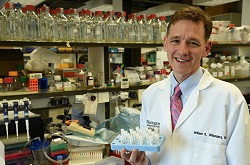 |
| A cluster of breast cancer cells--Courtesy of Wellcome Images |
In the troubled cancer vaccine field, where experimental jabs seem to be dropping like flies, a breast cancer vaccine developed at the Washington University School of Medicine in St. Louis has shown promising results in an early clinical trial.
While the trial was undertaken to test the safety of the vaccine, it showed that the vaccine slowed cancer progression, even in patients with weakened immune systems from advanced cancer and exposure to chemotherapy. Based on these preliminary results, the team at Washington University is planning a larger trial to test the vaccine in newly diagnosed breast cancer patients, who should have stronger immune systems.
The study, published in Clinical Cancer Research, involved 14 patients with metastatic breast cancer. According to the university, about half of the patients showed no progression of cancer one year after vaccination. This is statistically significant when compared to the control group, in which only one-fifth of the 12 unvaccinated patients showed no cancer progression one year later.
 |
| Dr. William Gillanders, breast cancer surgeon, senior author, and professor of surgery--Courtesy of Washington University in St. Louis |
The vaccine causes the immune system to target a protein called mammoglobin-A, which is found almost exclusively in breast tissue. In response to the vaccine, a type of white blood cell seeks and destroys cells that have the mammoglobin-A protein. While the protein's function in healthy tissue is unclear, it is expressed in abnormally high levels in up to 80% of breast tumors. It is not expressed at "meaningful levels" in other tissues, said breast cancer surgeon and senior author Dr. William Gillanders. This means that the vaccine could potentially be used to treat a large number of breast cancer patients with fewer side effects, he said.
However, the vaccine would not work in patients whose tumors are in the 20% that do not produce mammoglobin-A.
This year has seen multiple late-stage failures in the cancer vaccine landscape. In March, GlaxoSmithKline's ($GSK) MAGE-A3 didn't reach primary endpoints for non-small cell lung cancer, after having previously failed to outperform a placebo in a trial with melanoma patients. And Merck KGaA had its own late-stage failure in August, when its tecemotide--previously known as Stimuvax, which flunked a Phase III trial in 2012--flopped in a Phase I/II trial of patients with non-small cell lung cancer.
- read the release
Special Reports: ASCO preview: What's the outlook for cancer vaccines? | Top 10 Phase III disasters of 2014 - Tecemotide - MAGE-A3